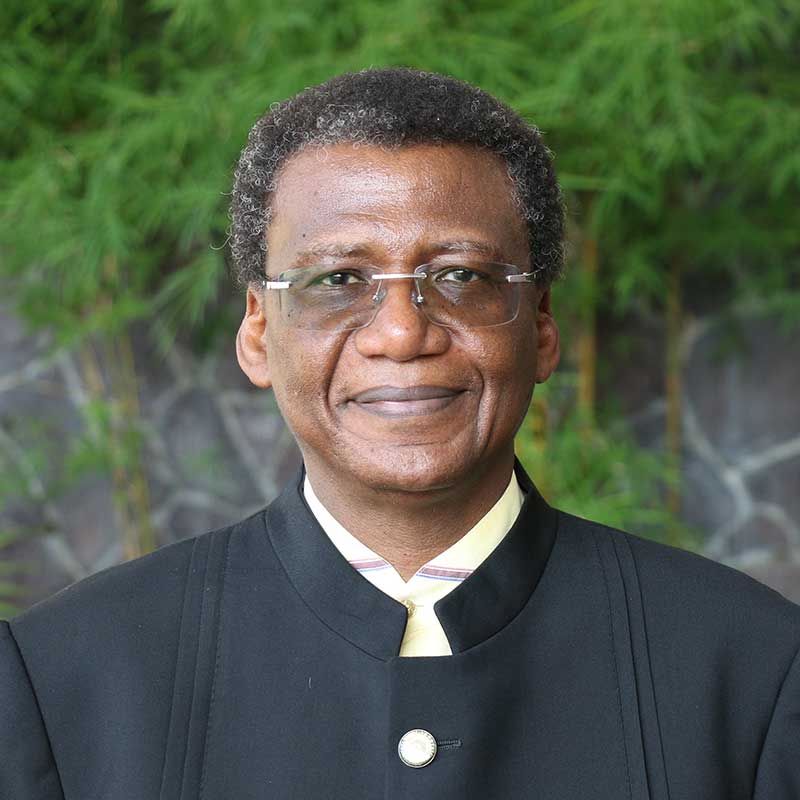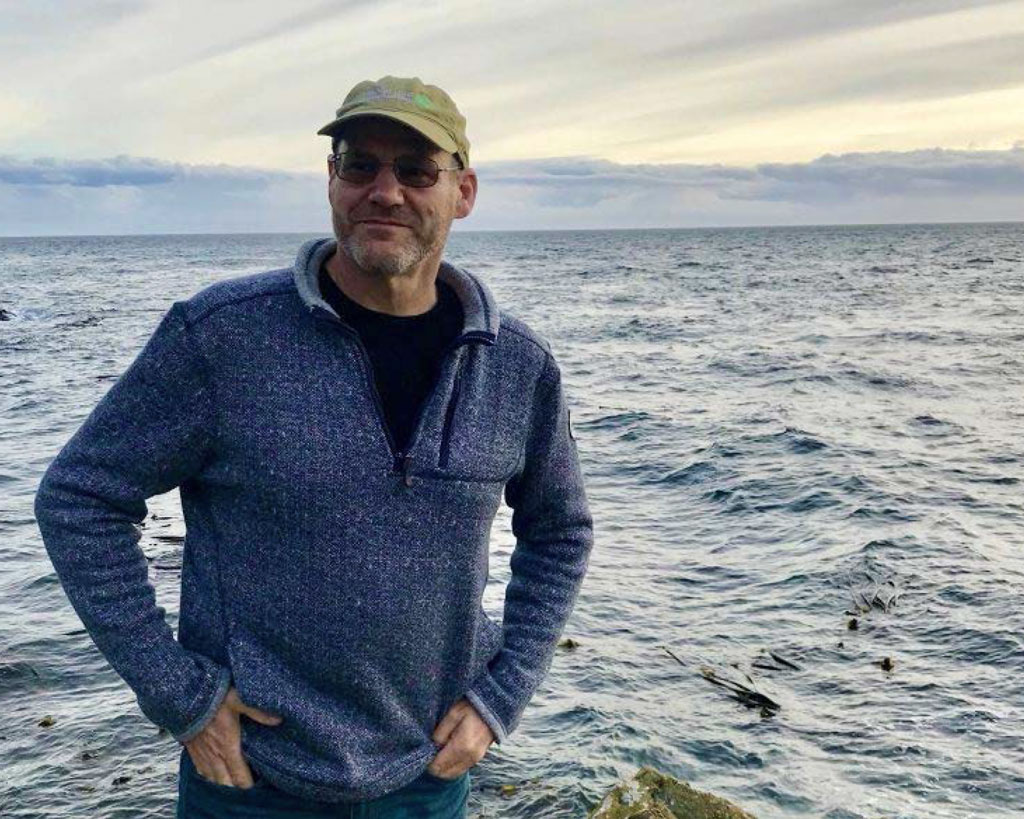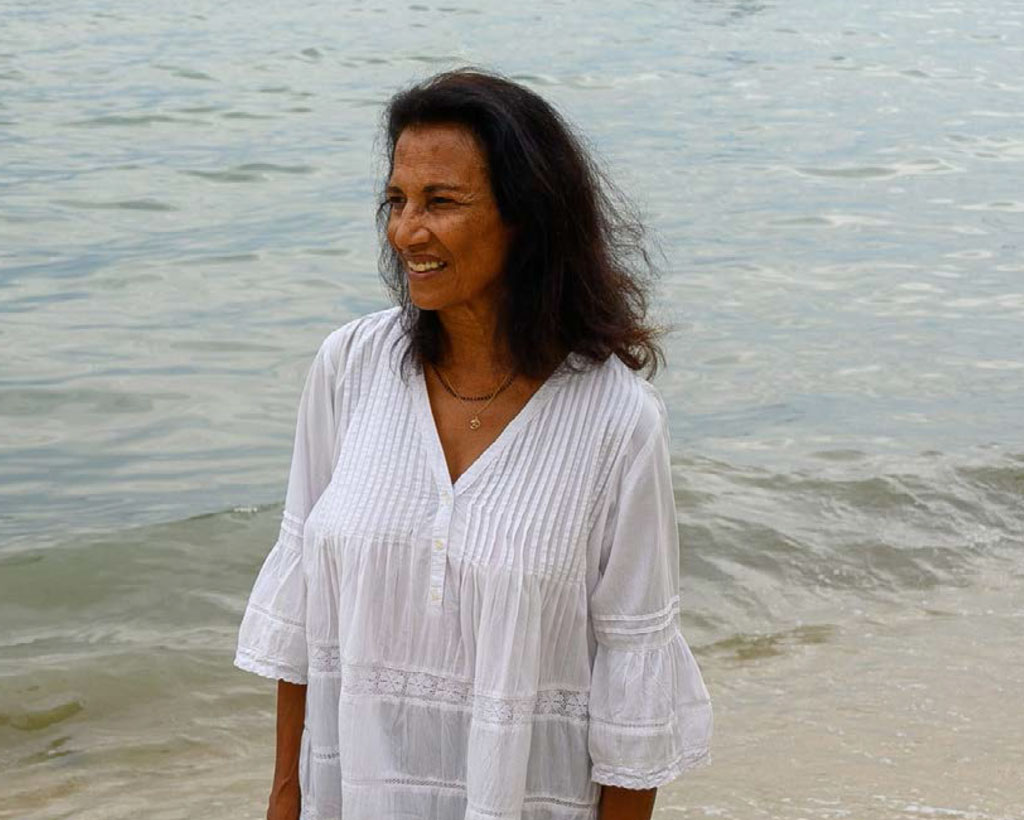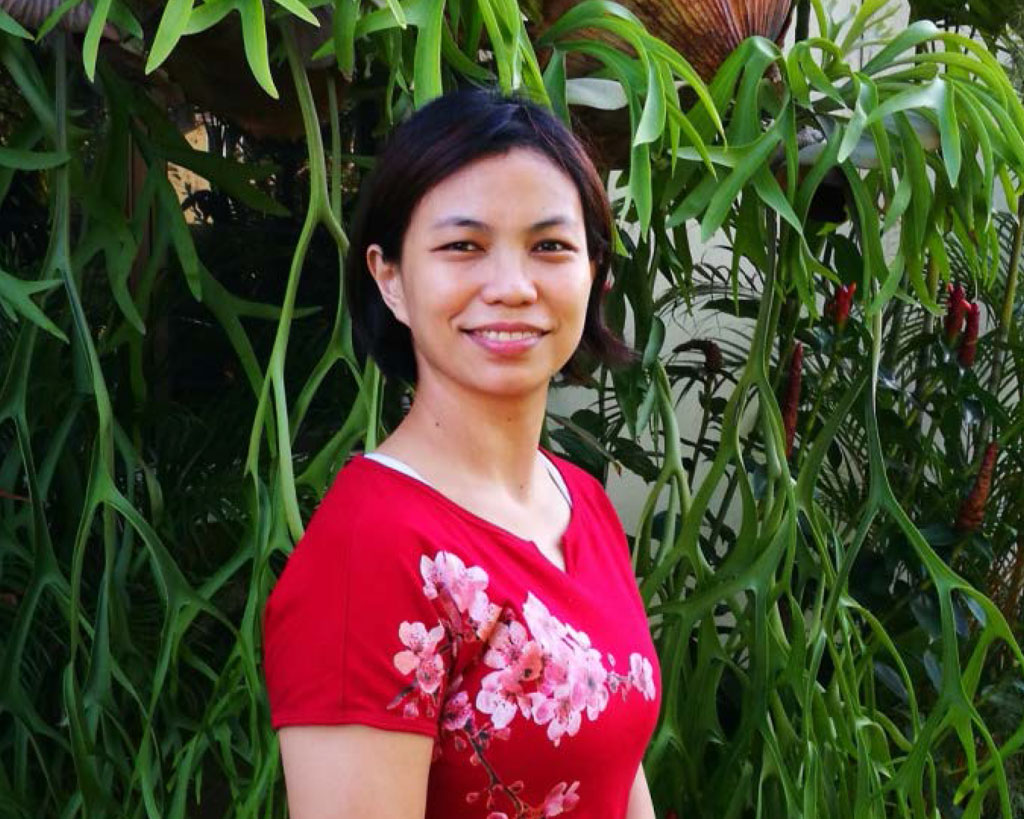Welcome Message
We sharpened the agility and responsiveness of our operations, devised an innovative business model to support our adaptation to new ways of working, secured new sources of funding for research and innovation in aquatic food systems, and reimagined scientific collaboration through an innovation ecosystem of public and private sector partners.
We launched the hugely successful 2030 WorldFish Research and Innovation Strategy: Aquatic Foods for Healthy People and Planet. The strategy broadens our mandate for research and innovation in aquatic food systems and outlines our new vision for an inclusive world of healthy, well-nourished people and a sustainable blue planet, now and in the future.

Gareth Johnstone,
Director General
We are fortunate to have the support not only of our funders, but also of the many organizations we partner with. We cannot advance the agenda for aquatic foods on our own, because the holistic approach we call for requires a wide range of interests and expertise to work alongside one another.

Baba Yusuf Abubakar,
Board Chair
Big Splashes in 2020
active partnerships
new partnerships in 2020
people reached via online events
active projects
capacity development initiatives
research innovations
publications during 2020
peer reviewed journal articles
publications are open access
publications with Altmetrics score above 100
2020 highlights
Strategic transformation for a decade of action with aquatic foods
Our new mission is to support the SDGs by ending hunger through research and innovation in transforming food, land, and water systems with aquatic foods for healthier people and the planet.
Building forward better with aquatic foods
Working with aquatic food system actors and governments in Asia, Africa and the Pacific, WorldFish monitors disruptions in aquatic food systems that impact food availability, affordability, incomes and livelihoods.
Combating global hunger through climate-resilient food systems
The organisation brought together influential researchers and representatives from the development, government, and private sectors to mobilize a global movement for sustainable and nutritious foods production and consumption.
Changing the way we think about food
WorldFish research and innovation on aquatic foods is shaping the narrative around food systems transformation. Our priority is to ensure greater integration of fish and aquatic foods into the global agricultural research agenda.
Sustainable blue economies
The potential of diverse aquatic foods spans beyond oceans with inland water bodies an extremely important part of global production. Focus on the potential of aquaculture in agricultural systems like rice and fish provides affordable ways to diversify and enrich people’s diets.
From research to impact
- All
- Livelihood
- Zero Hunger
- Policies
Policies to strengthen aquatic food systems for the poor
Multidisciplinary and cross-sector collaborations are at the heart of scientific discovery. Our partnerships span all levels of governance, from global level decision-making to national, subnational and household levels.
In November, WorldFish signed an MoU with the Government of Odisha, India to support women through small-scale aquaculture activities. This paved the way for fish powder and solar-dried small fish to be included in food rations of women and children in 50 sites within Mayurbhanj district. Children aged three to six in childcare centers are now served food containing fish powder during lunch. Adolescent and pregnant and lactating women who receive take-home food rations as part of the government’s Supplementary Nutrition Program will receive solar-dried small fish, adding essential nutrients to the daily diets of women and children.
WorldFish was also instrumental in informing policies that allow women in Odisha to engage in pond polyculture in village water tanks across the state. These traditionally restricted areas were opened up for the community, and women were encouraged to stock and harvest fish. These initiatives have benefited over 65,000 households, enabling women to participate in household decision-making. Women now have greater say in income and food distribution, and greater control over household expenses in general.
In December, WorldFish joined USAID and the Indo-American Chamber of Commerce for an investor forum to engage private sector impact investors for sustained innovation. The event highlighted strategic projects with potential to transform the nutrition and livelihoods of vulnerable communities in Odisha. The event connected investors’ goals to WorldFish project activities that promote inclusion of fish in diets of women and children, women and youth entrepreneurship in fish supply chains, and new fish polyculture technologies in local communities in Odisha.
Landmark agreement between WorldFish and Government of Odisha in India
In November, WorldFish signed an MoU with the Government of Odisha, India to support women through small-scale aquaculture activities. This paved the way for fish powder and solar-dried small fish to be included in food rations of women and children in 50 sites within Mayurbhanj district. Children aged three to six in childcare centers are now served food containing fish powder during lunch. Adolescent and pregnant and lactating women who receive take-home food rations as part of the government’s Supplementary Nutrition Program will receive solar-dried small fish, adding essential nutrients to the daily diets of women and children.
New policies for pond polyculture
WorldFish was also instrumental in informing policies that allow women in Odisha to engage in pond polyculture in village water tanks across the state. These traditionally restricted areas were opened up for the community, and women were encouraged to stock and harvest fish. These initiatives have benefited over 65,000 households, enabling women to participate in household decision-making. Women now have greater say in income and food distribution, and greater control over household expenses in general.
Engaging the private sector for sustained innovation
In December, WorldFish joined USAID and the Indo-American Chamber of Commerce for an investor forum to engage private sector impact investors for sustained innovation. The event highlighted strategic projects with potential to transform the nutrition and livelihoods of vulnerable communities in Odisha. The event connected investors’ goals to WorldFish project activities that promote inclusion of fish in diets of women and children, women and youth entrepreneurship in fish supply chains, and new fish polyculture technologies in local communities in Odisha.
Scientists shaping agendas
Top-cited researcher
This is a recognition of my contributions—working within research teams made up of my students, colleagues, partners—to a growing school of thought advocating the critical role diverse aquatic foods and food systems approaches have in the sustainable development agenda.
- Professor Eddie Allison

Professor Eddie Allison, Research Chair for Equity and Justice in the Blue Economy, WorldFish was recognized as the world’s mostcited researcher in the cross-disciplinary category in Clarivate’s 2020 Highly Cited Researchers (HCR) list. Allison appeared among fewer than 6,200 researchers from over 60 countries who have made significant contributions to their field through the publication of highly cited papers in the last decade. The recipients are determined according to publications ranked in the top 1 percent of citations in each field in the Web of Science index, with those who publish several such papers making the HCR list.
UN Food Systems Summit
Our goal, therefore, is to take a holistic approach to food system transformation. Solutions must move beyond land-based crops and livestock to food below water. The potential of diverse and nutritious aquatic foods is ripe for the picking, offering a path to produce sufficient food supply without increasing carbon emissions while reducing ecosystem stress and habitat loss
- Shakuntala Thilsted

WorldFish’s Shakuntala Thilsted has been appointed as the Vice Chair for Action, Track 4: Advance Equitable Livelihoods for the UN Food Systems Summit. In this role, Thilsted is responsible for guiding the global summit’s direction related to building sustainable, inclusive and nutritious food systems and value chains that support both people and planet. Thilsted’s appointment both ensures aquatic food systems and the communities they serve will be represented at the summit. It also ensures WorldFish and the CGIAR research commitments are acknowledged in planning for the summit. The summit will also offer a catalytic moment for global public mobilization and commitments to invest in ways to make food systems inclusive, climate-adapted and resilient, and support sustainable peace.
CGIAR Big Data Inspire Challenge
I hope our integrated tools and platform will prove useful not only to our target countries, but also to farmers worldwide who fall in the gap below the poverty line, those who are inexperienced or just beginning their farming venture, those who are unable to advance beyond traditional practices but experiencing new issues, and those who currently have no means to access the latest scientific breakthroughs in aquaculture.
- Laura Khor

WorldFish Research Fellow Laura Khor was selected as a top-10 finalist for CGIAR’s 2020 Inspire Challenge. The Challenge supports data-driven partnerships that push the limits of possibility in food security. It challenges partners, universities, and others to use CGIAR data to create innovative pilot projects that will scale.
Khor’s big data project focuses on the rapid field detection of hazards in aquatic foods in Malaysia and Bangladesh. Current detection methods of food hazards risks in the aquatic foods chains are costly, lengthy, and mostly unavailable where they are needed most. In response, Laura’s project proposes a portable, user-friendly point-and-shoot near infrared device for rapid field screening of key aquatic food contaminants. Prediction models will be developed from infrared calibration datasets via machine learning tools. Devices will then be deployed to remote areas to monitor aquaculture and small-scale fisheries value chains.
Our contribution to the Sustainable Development Goals
WorldFish is part of the global effort to eradicate poverty, hunger and malnutrition and reverse environmental degradation, as well as many complex global challenges reflected in the 2030 Sustainable Development Goals (SDGs). Ten of these SDGs are particularly pivotal to our work and mission. Hover over each SDG icon below to find out how we contribute to these goals.










Globally, approximately 800 million people depend on fisheries and aquaculture for their livelihoods. WorldFish works to create opportunities in sustainable and productive fisheries and aquaculture to help lift out of poverty people who rely on fish for their income, livelihoods and well-being.
Fish offers untapped potential to meet increasing demand for safe, nutritious food by a growing population. By developing fisheries and aquaculture in an environmentally and socially responsible way, WorldFish seeks to improve the availability of and access to diverse, nutrient-rich diets incorporating fish.
Fish, particularly small fish, are rich in micronutrients like vitamin A, iron, calcium, zinc and essential fatty acids. WorldFish strives to make quality fish available and affordable to the poor in developing countries, particularly women and children in the first 1000 days. Our research informs strategies for combating under- and malnutrition and for preventing public health issues, such as stunting and other non-communicable diseases related to poor diets and nutritional deficiencies.
Rural women play a vital role in fisheries and aquaculture as fishers, farmers, processors and traders. However, they often have unequal access to the resources and services they need to be successful. WorldFish works to address gender inequalities and their underlying factors in order to improve the fish-based livelihoods of women, who in turn amplify the benefits of these livelihoods for their children, families and communities.
WorldFish research shows that adopting new technologies alone is not enough to improve productivity. Using natural resources efficiently, pursuing innovation and having access to knowledge, networks or credit to invest in business and other entrepreneurial activities, especially for poor women and youth, are also vital and central to our contribution to this SDG, particularly in Small Island Developing States.
WorldFish works closely with national actors to enhance local capacities for scientific research and technological innovation in fisheries and aquaculture. We also support the integration of small-scale fish producers and enterprises into national, regional and global value chains and markets.
In the face of a growing world population and the impacts of climate change, there is an increasing imperative to do more and better with less. WorldFish works to achieve sustainable management and efficient use of natural resources and to reduce waste and loss along fish value chains.
Overfishing, ineffective management practices, industrial development, agricultural pollution and the impacts of climate change have reduced fish stocks. WorldFish conducts cutting-edge genetics research on improved and resilient fish species and promotes a sustainable approach to fisheries and aquaculture to ensure that enough nutritious fish are available for future generations.
Ensuring that all users benefit equitably from marine and aquatic resources requires new thinking, new information and greater collaboration between less traditional partners. Among the 15 members of the CGIAR, WorldFish is uniquely positioned to contribute to this SDG. We focus on generating evidence-based solutions that inform policies and practices relating to sustainable ocean governance and the development of an inclusive and people-centered blue economy, with special attention for the value and contribution of small-scale fisheries.
Many land-based activities, such as pollution, plastics, deforestation and livestock waste, are affecting, altering or destroying oceans, lakes and other inland aquatic ecosystems and habitats. Preserving life below water (SDG 14) also requires the adoption of environmentally sustainable practices on land. WorldFish research is informing interventions to reduce waste and loss in fish handling and processing, to conserve and restore degraded ecosystems in inland and coastal environments and to develop gender-responsive practices and technologies for innovative small-scale aquaculture systems with low environmental impact.
Living Our Values
We recognize that our scientific work and impact in the world is enhanced when we bring together a diversity of backgrounds, skills, disciplines, talents and partnerships that inform the way we work and shape our organizational culture and workplace, as well as our aspiration to be a global thought leader.
Our LEAD values
L
Learn
We are relentlessly curious and seek to learn from challenges and from others. We embrace discovery, daptation and growth. We rely on data and evidence to deepen our understanding, make the best decisions and drive bold innovation.
E
Excellence
Science of the highest quality and professional standards is the foundation for all we do. We actively partner with others who share our passion for excellence and impact.
A
Accountability
We take ownership of our work and promptly correct mistakes to the greatest extent possible. We honor our commitments to partners and to each other. We measure ourselves against the highest standards of integrity and fiscal responsibility, and we are open and transparent in communicating our results.
D
Diversity
We recognize it takes people with different ideas, talents, disciplines and backgrounds to make our work stand out. We encourage differing perspectives, healthy debate and an inclusive environment for all, and at every level, to create solutions to complex problems.
Communicating Science Knowledge And Evidence
Research alone is not enough to turn data, insights and innovations into concrete action and tangible impacts on the ground. As an international research and innovation organization, we believe it is our duty to effectively engage with society and share the results of our research work beyond the scientific community
To us, communication is a critical 21st-century skill. It is a strategic organizational function that allows us to provide a tangible return on society’s trust and continued investment in science and in us as a vibrant community of scientists who care about the meaningful impact of our work in the real world. It also plays an important role in how staff, partners and stakeholders interpret the cultural landscape of our organization in terms of who we are, what we stand for, what we value and why our mission matters.
Aside from helping the public appreciate the wonder, pleasure and critical importance of science to our lives, communicating scientific discoveries and research evidence effectively is critical to important decisions from household to global levels that affect our quality of life and the future of our planet.
Over the next 10 years, we will use evidence-based communications to make aquatic foods part of the conversation to address critical sustainable development challenges. At the same time, we will note the rightful place and contribution of aquatic food systems to the global call to action for a food systems transformation to healthier and sustainable diets.
Commitments
Our philosophy and practices of communications, in varied forms and mediums, will be guided by three key commitments:
- Advocacy and strategic outreach: We will resource and use evidence-based communications for advocacy and strategic outreach to stimulate increased public awareness of and policy discourse on aquatic foods, as well as public and funders’ interest in the mission and research work of WorldFish, One CGIAR and our partners.
- Internal communications: We will strengthen communications internally to ensure shared understanding of the organizational vision, mission, values and research work to (a) stimulate an open and high-performance culture of learning, knowledge sharing and innovation (b) facilitate increased collaboration across disciplines, functions and geographical locations, and (c) celebrate individual, team and organizational achievements.
- Digital transformation: We will use innovative information and communication technologies and data-rich technology platforms to share, translate and communicate research data, knowledge and insights with the largest numbers and broadest kinds of internal and external stakeholders in fast, compelling, engaging and cost-effective ways. We will also enhance learning, new ways of working and digital-savvy leadership at individual, team and organizational levels.
Impact
40,718 followers on Linkedin;
145% growth in 2020
19,158 followers on Facebook;
1,639 new followers on Facebook in 2020
17,286 followers on Twitter;
2,118 new followers on Twitter 2020
Media coverage: Mentioned
2,189,579,086 times in 2020
Selected Publications
Meeting fisheries, ecosystem function, and biodiversity goals in a humandominated world
Climate change, overfishing and pollution affects millions of people who depend on the beauty and bounty of coral reefs. Profession Joshua Cinner led ..
Cinner JE, Zamborain-Mason J, Gurney GG, Graham NAJ, MacNeil MA, Hoey AS, Mora C, Villéger S, Maire E, McClanahan TR, Maina JM, Kittinger JN, Hicks CC, D’Agata S, Huchery C, Barnes ML, Feary DA, Williams ID, Kulbicki M, Vigliola L, Wantiez L, Edgar GJ, Stuart-Smith RD, Sandin SA, Green AL, Beger M, Friedlander AM, Wilson SK, Brokovich E, Brooks AJ, Cruz-Motta JJ, Booth DJ, Chabanet P, Tupper M, Ferse SCA, Sumaila UR, Hardt MJ, Mouillot D
Social determinants of adaptive and transformative responses to climate change
The authors examine how social determinants are related to adaptive and transformative actions for people to cope effectively with the impacts of climate change..
Barnes ML, Wang P, Cinner JE, Graham NAJ, Guerrero AM, Jasny L, Lau J, Sutcliffe SR, Zamborain-Mason J
Climate change, tropical fisheries and prospects for sustainable development
Tropical marine habitats and fish stocks are vulnerable to the physical and biogeochemical oceanic changes associated with rising greenhouse gases. In this review..
Lam VWY, Allison EH, Bell JD, Blythe J, Cheung WWL, Frölicher TL, Gasalla MA, Sumaila UR
Evidence for action: A One Health learning platform on interventions to tackle antimicrobial resistance
Within the efforts to strengthen the global governance of antimicrobial resistance, we advocate for the creation of an international One Health platform for online learning..
Wernli D, Jørgensen PS, Parmley JE, Troell M, Majowicz S, Harbarth S, Leger A, Lambraki I, Graells T, Henriksson PJ, Carson C, Cousins M, Skoog Stahlgren G, Chadag V, Simpson AJ, Wieland B, Pederson K, Schneider A, Chandy SJ, Wijayathilaka TP, DelamareDeboutteville J, Vila J, Stalsby Lundborg C, Pittet D
Emerging COVID-19 impacts, responses, and lessons for building resilience in the seafood system
The COVID-19 pandemic and subsequent lockdowns are creating health and economic crises that threaten food and nutrition security. The seafood sector provides important..
Love D, Allison EH, Asche F, Belton B, Cottrell RS, Froehlich HE, Gephart JA, Hicks CC, Little DC, Nussbaumer EM, da Silva PP, Poulain F, Rubio A, Stoll JS, Tlusty MF, Thorne-Lyman AL, Troell M, Zhang WB
Our Partners
Our work is rooted in multidisciplinary science and food systems thinking. It is guided by national priorities and the capacity development needed to improve agricultural research and extension systems. It is enhanced by our unique ability to convene and broker novel partnerships with development actors and the private sector as a mechanism to take innovations and have impact at scale.
Financial Overview
We are committed to managing our finances efficiently and transparently. This section provides an overview of our financial position for the year ended 31 December 2020.
| STATEMENT OF FINANCIAL POSITION (USD ‘000) | ||
|---|---|---|
| As of 31 Dec 2020 | As of 31 Dec 2019 | |
| ASSETS | ||
| Cash and cash equivalents | 18,048 | 17,224 |
| Account receivable | 3,098 | 3,808 |
| Other current assets | 330 | 256 |
| Capital assets | 684 | 818 |
| TOTAL ASSETS | 22,160 | 22,106 |
| LIABILITIES | ||
| Accounts payable | 12,605 | 11,600 |
| Accruals and provisions | 1,375 | 1,507 |
| Other current liabilities | 199 | 219 |
| Non-current liabilities | 477 | 566 |
| TOTAL LIABILITIES | 14,656 | 13,892 |
| NET ASSETS | 7,504 | 8,214 |
| TOTAL LIABILITIES AND NET ASSETS | 22,160 | 22,106 |
| STATEMENT OF OPERATING ACTIVITIES (USD ‘000) | ||
|---|---|---|
| For the years ended December 31 | 2020 | 2019 |
| REVENUE | ||
| Grants | 30,769 | 32,652 |
| Other income | 555 | 416 |
| TOTAL REVENUE | 31,324 | 33,068 |
| EXPENSES | ||
| Research | 20,722 | 21,224 |
| Administration, support and other | 11,312 | 12,458 |
| TOTAL EXPENSES | 32,034 | 33,682 |
| NET DEFICIT | (710) | (614) |
Expenditure by region
Total: 32,366,507 USD
Total funding globally
Leadership and governance
Our leadership team is a diverse, global group of leaders who bring decades of experience in scientific research, international and organizational development and communications.Board of Trustees
The Board of Trustees approves the WorldFish’s long-term organizational strategy, annual plan of work and budget and research agenda, monitors progress toward the achievement of the center’s mission, sets and approves programs and policies and financial regulations, exercises oversight of investment and risk management and ensures compliance with relevant legal and regulatory requirements. It also has scientific oversight and fiduciary responsibility for the implementation of FISH.
Executive Team
The Executive Team comprises the Director General, the Director of the CGIAR Research Program on Fish Agri-Food Systems and Aquaculture and Fisheries Sciences, the Director of International Partnerships and Program Delivery, the Director of Communications and Marketing, the Director of Finance and IT and the Director of Human Resources and Administration. The Director General is delegated by the Board of Trustees to implement the organizational strategy, programs, policies and plans. The Executive Team works together to realize the strategy, research agenda and organizational vision for WorldFish and take decisions on issues that affect the organization across various functions at all levels.
Global research leaders
The global research leaders are responsible for the overall coordination and management of our research agenda. The team reviews the annual work plans developed at country and regional levels to ensure consistency with our strategic goals and allocate appropriate budget.
Country directors
The country directors are accountable for the leadership and management of our country programs. Working collaboratively with our global research and functional leaders, country directors deliver an integrated research-for-development program that addresses national priorities and organizational goals, strengthens institutional and partner capabilities across the aquaculture and fisheries sectors, including building capacities, policy influence and evidence-based research capabilities.
BOARD OF TRUSTEES
Baba Yusuf Abubakar, Nigeria, Board Chair
Abdou Tenkouano, Senegal, Chair, Governance Committee
Cristina Rumbaitis del Rio , United States, Chair, Audit & Risk Committee
Ayman Anwar Ammar , Egypt, Ex-officio Board Member
Gareth Johnstone , Malaysia, Ex-officio Board Member
Neal Gutterson , United States
Alice Ruhweza , Uganda
Marco Ferroni , Switzerland
Alyssa Jade MacDonald-Baertl , Australia
Hilary Wild , United Kingdom
Shenggen Fan , China
Patrick Caron , France
EXECUTIVE TEAM
Gareth Johnstone, Director General
Marion Barriskell, Executive Director, Corporate Services
Michael Phillips, Director, Aquaculture and Fisheries Science for CGIAR Research Program on Fish Agri-Food Systems
Montgomery Simus, Executive Director, Business Development and Partnerships (joined 14 September 2020)
Tana Lala-Pritchard, Executive Director, Strategy, Innovation and Communications
Zarinah Davies, Director, Human Resources and Administration
GLOBAL RESEARCH LEAD
John Benzie, Program Leader, Sustainable Aquaculture
Philippa Cohen, Program Leader, Resilient Small-scale Fisheries
Shakuntala Thilsted, Global Lead, Nutrition and Public Health
Essam Yassin Mohammed, Global Lead, Climate Resilience and Environmental Sustainability (joined 15 June 2020)
Cynthia McDougall, Research Leader, Gender
Cristiano Rossignoli, Monitoring, Evaluation and Learning (MEL) and Impact Assessment Lead
COUNTRY DIRECTORS
Ahmed Mohamed Nasr-Allah, Officer-in-Charge, Egypt
Christopher Price, Regional Director, South Asia
Delvene Boso, Country Director, Solomon Islands
Michael Akester, Regional Director South East Asia and Pacific (SEAP)
Pablo Degl’Innocenti, Country Director, Cambodia (term ended 31 December 2020)
Sunil Siriwardena, Officer-in-Charge, Nigeria
Victor Siamudaala, Country Director, Zambia and Southern Africa

